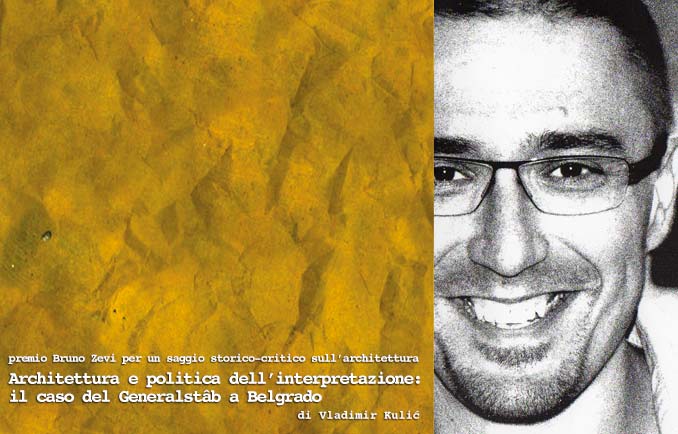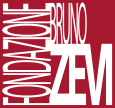Vladimir Kulić is the winner of the Bruno Zevi Prize 2009

The 2009 Bruno Zevi Prize was awarded to Vladimir Kulić for the essay entitled Architecture and Politics of Interpretation: the Case of the Generalstâb in Belgrade, by the jury composed of: Giovanni Carbonara, Philippe Duboy, Mary McLeod, Sergio Pace and James Wines.
The peculiarity of the essay by Vladimir Kulić, winner of third edition of the Bruno Zevi Award, is that of confronting the crucial relationship between culture and politics by examining the history of a symbolic building such as the Generalštab in Belgrade, a city in one of the most complex and tormented regions of Europe.
A dyed-in-the-wool modernist and fighting partisan, Nikola Dobrovic designed and constructed the Generalštab between 1954 and 1963, the years of intense construction by the communist government of the former Yugoslavia. The two options, one professional and the other political, while compatible elsewhere, in this case conflicted and worked towards the exegis of the emblematic building. It is this condition that inspires the title of the essay: The Architecture and Politics of Interpretation. In fact, depending upon the period in history, spatial and structural qualities triumph over symbolic values, and vice versa. Kulic’s fascinating investigation unites the necessary detachment of the historian with the authentic participation of an eyewitness.
Kulic’s essay, the jury pointed out, “is written with a sharp critical approach and a broad horizon. It deals with arguments worthy of attention outside of Serbia and, furthermore, represents a useful tool for the restoration of the building, a monument to all effects and purposes, damaged during the 1999 bombing raids. The essay is articulated using accurate archival references, an attentive direct reading of the monument and a balanced framing of the historical-cultural context during which it was both designed and constructed, maintaining a healthy distance from even the most recent historical and political events. A brilliant essay that is culturally open, well structured and clearly argued, and rendered original by the numerous approaches to interpretation it offers”.
Vladimir Kulić was born in Sombor in 1968. He teaches Architectural History at Florida Atlantic University in Fort Lauderdale, USA.

 Italiano
Italiano